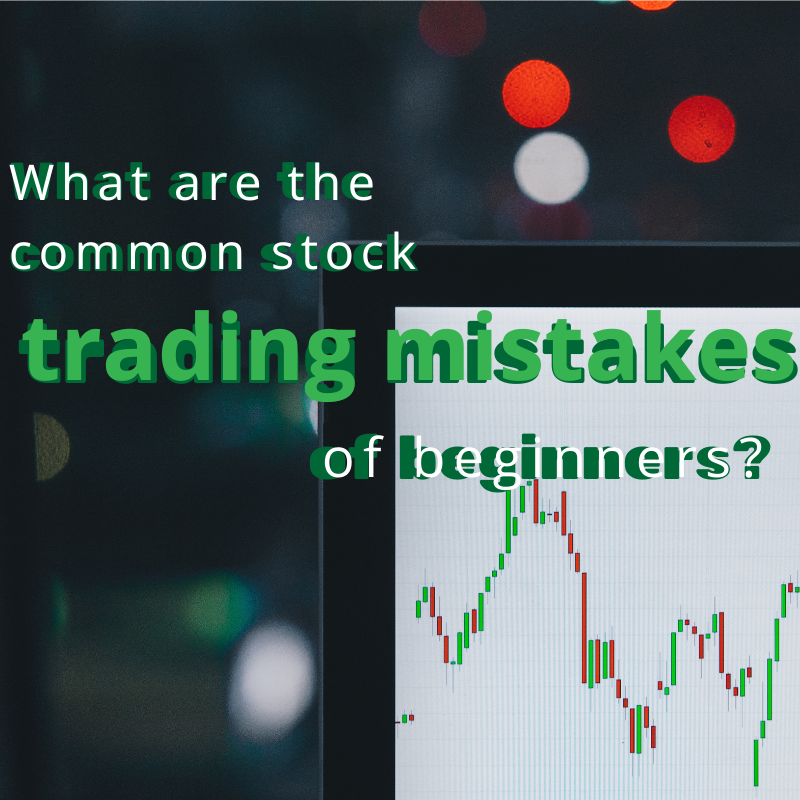Financial, Stock Market
What are the common stock trading mistakes of beginners?
Here are the common stock trading mistakes of beginners:
No Trading Strategy
Beginner traders might need a trading strategy before starting to trade to avoid mistake. Even if they have a plan, they might be more likely than experienced traders to deviate from it. Novice traders might completely change their course.
-
Chasing Markets With Strong Performance
– Many beginner traders frequently choose an asset or market that has historically performed well over the prior few years. This “Fear Of Missing Out” mindset has likely led to more poor investing choices than good ones. With all the smart money leaving and the traders making mistakes (the dumb money) flooding in, the market that has been performing well for those few years may be nearing its conclusion.
-
Failure to Regain Balance
– The rebalancing process involves returning your portfolio to the desired asset allocation specified in your investment strategy. Rebalancing is challenging because a beginner investor might be forced to sell his best-performing asset class and increase his holdings in your worst-performing one.
-
Overlooking Risk Aversion
– Keep in mind the risk tolerance and willingness to take on danger. Some investors find it challenging to handle the volatility, swings in the market, or more risky trades. If an investment promises very appealing profits, consider the risk involved and the potential loss of capital.
-
Losing Track of Your Time Horizon
– Without the time horizon in mind, investing might lead to failure. This is because every investment is either long-term or short-term, and its rate of return will vary depending on how long it lasts.
-
Stop-Loss Orders Not Being Used
– Trading without a stop-loss level is like operating a vehicle without brakes. Nevertheless, many traders continue to trade without using this helpful tool. And it usually results in heartbreaking losses. unneeded and preventable losses.
-
Letting Losses Increase
– Beginner traders may become frozen if a trade goes against them. They might choose to stay in a losing position in anticipation that the trade will eventually succeed rather than moving quickly to stop a loss. A losing trade may hold up trading cash for a considerable time, causing significant capital depletion and rising losses.
-
Taking Too Big Positions
– Without a question, every trader dreams of winning a large deal. There is no assurance that the trade will go as desired by the investor. Therefore, if an investor puts 50% of his money at risk in one transaction and that deal fails, it will significantly reduce his trading capital.
-
The Value of Acknowledging Losses in Common Stock
– Investors much too frequently refuse to acknowledge the truth that they are only human and subject to error, just like the best investors. Holding onto a lost investment out of pride rather than financial necessity is the worst thing an investor can do.
-
Believing in False Buy Signals
– A decrease in common stock price could be caused by deteriorating fundamentals, the resignation of a CEO, or greater competition. The same factors also indicate that the common stock may not rise for a while. Beginner investors frequently trust this without doing any research.
-
Purchasing With Excessive Margin
– The worst thing a novice trader can do becomes overexcited with what appears to be free money. If he uses margin and his investment doesn’t work out as he had hoped, he will be left with a significant debt obligation.
-
Over Leveraging
– Beginner traders may be mesmerized by the amount of leverage they have, mainly when trading forex, but they may quickly learn that too much leverage can quickly wipe their trading capital. A 2% negative swing is all it takes to wipe out one’s capital when a leverage ratio of 50:1 is used in retail forex trading.
-
Following the Crowd
– Another common error beginner traders make is blindly following the crowd. As a result, they may overpay for hot common stocks or start short positions in assets that have previously fallen and may be about to recover.
-
Not Diversifying
– Many inexperienced common stock traders need to diversify their holdings. The fact that diversification lowers risk is what makes it so crucial. If an investor invests in various stocks, he reduces the likelihood that one of them will fail and lose everything.
-
Neglecting Assignments
– Before starting a transaction, new traders frequently need to do their homework, research, or exercise due diligence. For a novice trader, the need to execute a deal quickly sometimes outweighs the need to conduct some research, but this could lead to an expensive lesson later on.
-
Buying False Tips in Common Stock
– Most investors fall victim to this error sometime during their investment careers. Even if these recommendations are accurate, that does not necessarily mean that an investor needs to open his online brokerage account immediately and place a buy order on the common stock because it is “the next big thing.”
-
Excessive Financial Television Viewing
– Almost no information about achieving your goals can be found on financial news programs. Would they tell it on TV or sell it to you for money if they genuinely had great common stock tips, trading guidance, or a secret formula to earn big money? No. They would remain silent, amass their fortune, and wouldn’t require the sale of a newsletter to survive.
-
Unable to See the Big Picture
– A qualitative analysis or considering the big picture is one of the most crucial yet frequently skipped steps for a long-term investor. Therefore, pouring through financial accounts or trying to spot buy and sell chances may often be successful still, if the world is shifting against the company.
-
Trading Several Markets in Common Stock
– Beginner traders may switch between markets, such as stocks, options, currencies, commodity futures, etc. Trading in several markets can be quite distracting and may impede a new trader from getting the experience required to succeed in one market.
-
The Risk of Over-Confidence
– Although trading is a reasonably tough profession, some new traders may mistakenly feel that it is the proverbial shortcut to easy money due to their “beginner’s luck” experience. Such overconfidence is risky since it promotes complacency and excessive risk-taking, which could lead to a trading disaster.
-
Inexperienced With Day Trading
– Only the most experienced investors should attempt day trading because it can be risky. Think twice before day trading unless a trader has the necessary knowledge, a platform, and access to quick order execution. There are much better options for traders who want to accumulate wealth if they aren’t very good at managing risk and stress.
-
Underestimating Capabilities
– Some investors tend to think that because sophisticated investors are the only ones who can succeed in the stock market, they will never be successful investors. Refrain from assuming that a trader’s day job prevents him from successfully trading in the financial markets. Keep in mind that a lot of investing involves using logic and common sense.
-
Getting Emotional
– All traders have felt that way when they’re having a good run and believe they can do no wrong. It’s good to be enthusiastic about trading; confidence is always a plus, but avoid letting your emotions control your trading decisions and forcing yourself into positions you wouldn’t normally take.
-
Investing Before Being Financially Ready
– Stock market trading is risky for novice investors because results aren’t always guaranteed. For instance, they could experience losses during bad markets and wind up with even greater debt.
-
Not Tracking Trades in a Trading Journal
– A successful trader requires him to keep a trading journal, which is essential. It takes a little more knowledge and focuses than simply writing down your entry and exit points for winning trades.
-
MUST-READ AND SHARE!
2023 Your Practical Wedding Guide
Your Ultimate Access to Kuwait Directories in this COVID-19 Crisis
Investments and Finance Ultimate Guide
OFW FINANCE – Money News Update that you need to read (Table of Contents)
A Devotional for having a Grateful Heart
Stock Investment A Beginner’s Guide
How To Save Money Amidst Inflation
Philippines Best Banks with High-Yield Savings Return
Essentials Before Applying For a Credit Card
Credit Card Starter Guide for Beginners
If you like this article please share and love my page DIARYNIGRACIA PAGE Questions, suggestions send me at diarynigracia @ gmail (dot) com
You may also follow my Instagram account featuring microliterature #microlit. For more of my artworks, visit DIARYNIGRACIA INSTAGRAM

A multi-award-winning blogger and advocate for OFWs and investment literacy; recipient of the Mass Media Advocacy Award, Philippine Expat Blog Award, and Most Outstanding Balikbayan Award. Her first book, The Global Filipino Bloggers OFW Edition, was launched at the Philippine Embassy in Kuwait. A certified Registered Financial Planner of the Philippines specializing in the Stock Market. A recognized author of the National Book Development Board of the Philippines. Co-founder of Teachers Specialist Organization in Kuwait (TSOK) and Filipino Bloggers in Kuwait (FBK). An international member of writing and poetry. Published more than 10 books. Read more: About DiaryNiGracia
Acknowledgements
DISCLAIMER



Peace and love to you.